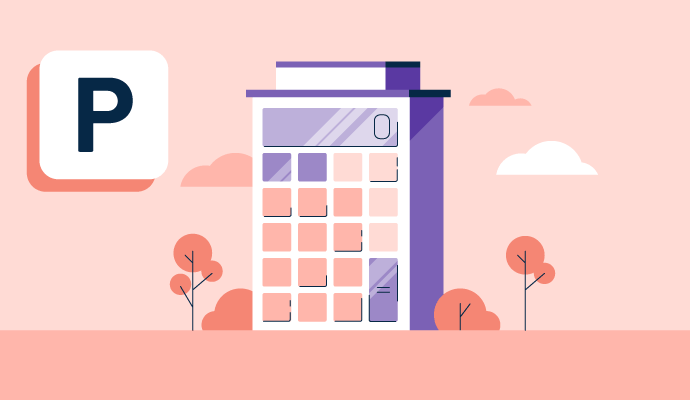What is property accounting?
Property accounting records cash inflows and outflows to estimate total profits or losses on renting out real estate. It helps landlords or rental business owners (or managers) overview rental income and expenses, helping them make better plans and increase profits.
Property accounting ensures that real estate managers identify net income from different properties managed by a company. Many real estate rental agencies use property management software to automate day-to-day responsibilities. This software helps real estate managers ensure effective accounting, leasing, and daily real estate rental operations. Whether the real estate rental portfolio is small or large, property management software provides seamless accounting capabilities to benefit from residential and commercial property rentals.
Types of property income and expenses
Property managers encounter different income and expenses for individual properties.
Common types of income include:
- Monthly rent
- Fine for late rental payments
- Fine for premature termination of the lease
- Pet rental
- Rental for appliances
- Refundable security deposits to pay for property damage
Refundable deposits are shown as short-term liabilities on the property accounting balance sheet. Property owners need to return it when the lease expires. Refundable deposits are treated as income when landlords use them to expense any damage caused by the tenants.
At the same time, landlords deal with different types of expenses while managing a property. Common expenses include:
- Repair and maintenance
- Mortgage interest payment
- Mortgage principal payment
- Leasing fees
- Marketing and advertising costs
- Utility payments
- Property management charges
- Professional services fees
Benefits of property accounting
Real estate property accounting helps rental agencies get tax benefits offered by the governing authorities. It allows managers to track investments in real estate and compare their profitability over time.
Various other reasons make property management accounting essential for real estate rental businesses.
Property accounting helps property owners (or managers):
- Reduce operating expenses and increase revenue
- Ensure that a real estate rental business meets its payment obligations
- Create balance sheets and income statements to measure current performance and plan future investments
- Prepare tax-ready annual financial statements
Elements of property management accounting
Property owners or managers can set up property management accounting by focusing on the elements mentioned below.
Separate bank account
Conducting all business transactions from a personal account makes it challenging to track them. Such a practice is a big no in the eyes of the legal authorities. It's better to keep and maintain separate accounts for business and personal transactions.
Moreover, it's even better if landlords have separate property accounts for income/expenses and refundable security deposits. It helps them avoid spending the refundable deposits on personal or business expenses. Since these are short-term liabilities, landlords would have to repay the security deposit at the end of the lease period (provided there are no damages).
Accounting method
Property managers can track the inflow and outflow of funds using two types of accounting methods.
- Accrual accounting: Accountants record income and expenses as they happen, regardless of whether the funds hit the landlord's bank account or are still being processed. For example, if a tenant pays $4000 upfront for four months' rent, the accountant will add only $1000s as monthly income in the accrual statement.
- Cash basis accounting: With this method, accountants enter transactions in the books when money changes hands. For example, if $4000 rent is paid upfront, $4000 will go into the books as income.
The cash basis accounting method is prevalent among small businesses. Property managers or accountants can choose either method of choice depending on how they want to track their income.
Chart of accounts
A chart of accounts acts as a reference in property accounting. It can be in a spreadsheet, a text document, or a separate tab (while using accounting software. This chart of accounts helps accountants gain insights into rental income and expenses. It makes the books detailed but more complex at the same time.
Journal
Accountants can maintain a spreadsheet journal and organize it to record monthly transactions. This is suitable for single-entry bookkeeping, an accounting style preferred in simple businesses.
Financial statements
Accountants can use information in the journals to create a financial statement for their properties. There are various financial statements that show a business' performance, including:
- Income statement: Shows total money made during the reporting period
- Cash flow statement: Records how money is exchanged between different business parts and a company's bank account
- Balance sheets: Keeps track of a business’ assets and liabilities
Rental businesses can create financial statements internally or use accounting software to produce accurate reports.
Property accounting best practices
Here are some best practices property managers or owners can follow to profit from their rental business.
- Record waivers. In situations like a pandemic, it makes sense to partially waive fees or extend the payment deadlines. Managers should ensure that every waiver is recorded and tracked to avoid huge payment dues.
- Use property management accounting software. Automate processes related to accounting with dedicated property management accounting software to save time and effort. It helps rental businesses make accounting efficient and effective.
- Keep an emergency fund. Any property management business might come across unforeseeable expenses regardless of an impeccable strategy. Keep a rainy-day fund aside to handle such costs and avoid tapping into the primary business account.
- Verify transactions frequently. Avoid errors and spot typos, failed transactions, payment dues, or overpayments by checking books at the end of each month while maintaining accurate bookkeeping.
- Check for tax deductions. Look for opportunities to save money and claim tax deductions. With optimal property accounting, businesses would have all of their transactions in one place, making it easier to identify transactions eligible for tax deductions.

Sagar Joshi
Sagar Joshi is a former content marketing specialist at G2 in India. He is an engineer with a keen interest in data analytics and cybersecurity. He writes about topics related to them. You can find him reading books, learning a new language, or playing pool in his free time.

